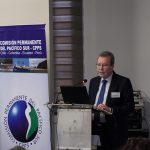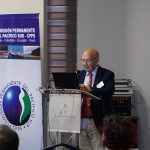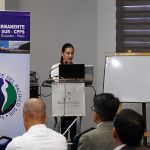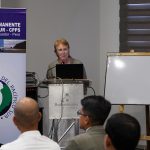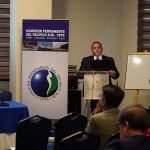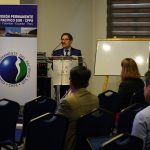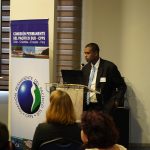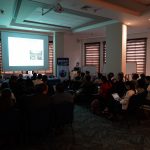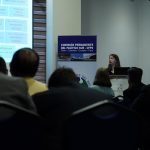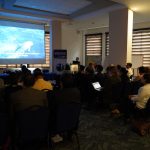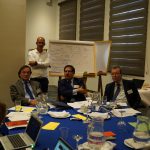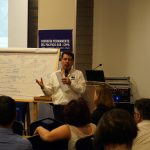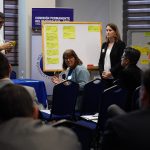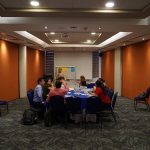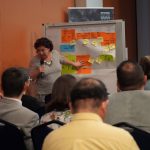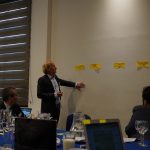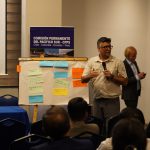Representatives from Colombia, Chile, Ecuador and Peru (CPPS member States) as well as Panama, global and regional organisations, regional scientific institutions, academia and NGOs to took part in a two-day workshop organised by the STRONG High Seas Project and CPPS Secretariat. A total of 41 participants attended the workshop. The workshop took place from 13-14 June in Cali, Colombia, and provided the participants with an opportunity to discuss the current status, interests and challenges for global and regional ocean governance and to foster exchange and build new networks.
The STRONG High Seas project is a five-year project that aims to strengthen regional ocean governance for the conservation and sustainable use of marine biodiversity in areas beyond national jurisdiction. Collaborating with the Secretariat of the Comisión Permanente del Pacífico Sur (CPPS; Permanent Commission for the South Pacific), the project aims to develop and propose targeted measures to support the coordinated development of integrated and ecosystem-based management approaches for ocean governance in the Southeast Pacific.
Key messages from the workshop
- The workshop highlighted the importance of high seas biodiversity both globally and to the region of the Southeast Pacific for human activities, such as fisheries, as well as ecosystem services, such as climate change regulation.
- The CPPS member States – Chile, Colombia, Ecuador, and Peru – as well as Panama outlined the important role of conservation and sustainable use of marine biodiversity in their respective national ocean strategies.
- The connectivity between marine areas beyond national jurisdiction (ABNJ) and coastal areas was recognised as a critical factor affecting the status of marine health and ultimately human wellbeing.
- Key pressures on the high seas in the Southeast Pacific were identified to be pollution through materials and waste, overexploitation of marine resources, destruction of marine habitats, incidental capture, noise pollution, contamination through fuels and ballast water disposal, greenhouse gas emissions (climate change) and collisions. Workshop participants agreed that most of these pressures will likely increase in the future as activities on the high seas will expand.
- Scientific knowledge was highlighted as a crucial building block for future governance and management of marine biodiversity. Many data gaps exist and especially socioeconomic information and information regarding pressures in ABNJ need to be assessed more systematically. Uncertainties make it highly challenging to forecast future scenarios and develop adequate management approaches
- Workshop participants agreed that knowledge exchange, collaboration and cooperation within the region should be improved, especially in view of the UN negotiations on the conservation and sustainable use of marine biodiversity beyond national jurisdiction (BBNJ) and with regard to regional actions.
- Participants identified in particular the lack of an information-sharing mechanism and the lack of a centralised information platform.
- CPPS was identified as having a highly important convening role in the region in terms of coordination between the various public and private research institutes and its member States as well as an important data repository (ex. SPINCAM project data, etc.). It was recommended to further expand the existing platform to include, for example, details on regional events such as conference and workshops, a space to share reports and data, as well as a directory of experts.
- CPPS member States proposed developing a shared regional vision for ABNJ to gather and agree on key principles and relevant issues. Regular inter-agency meetings on ABNJ as well as the establishment of a coordination group under the CPPS could help strengthen collaboration and facilitate the development of such a vision.
- Capacity building and technology transfer was identified as the most important BBNJ topic for the region, being the basis for the other BBNJ elements (i.e. area-based management tools, environmental impact assessments, and marine genetic resources) to be negotiated at the UN.
- Foreign Affairs ministries have a key role to play in global ABNJ issues as they are the focal points for the coordination of national efforts on these issues and are tasked to lead their country’s delegation at the UN BBNJ negotiations.
- Capacity building has been identified as a key requirement to enable ministry representatives involved in the BBNJ process to actively take part and shape the BBNJ discussions and negotiations. In this respect, capacity building workshops on key issues pertaining to the BBNJ negotiations have been identified as important for CPPS countries’ ministries. Webinars have also been identified as being a useful tool that allows more stakeholders to be informed about relevant BBNJ issues while keeping the costs relatively low.
- Public and private sectors, civil society and academia are relevant stakeholders in the ABNJ discussions and need to be involved. The inclusion of a broader range of stakeholders in future dialogue workshops is envisaged to further strengthen collaboration and exchange.
The complete workshop summary can be found here in English and here in Spanish.
The workshop agenda can be found here in English and here in Spanish.
The workshop presentations can be found here (English and Spanish).



